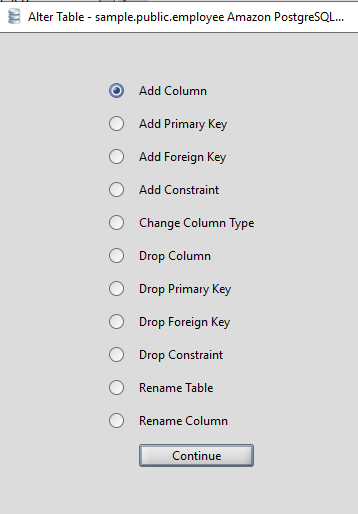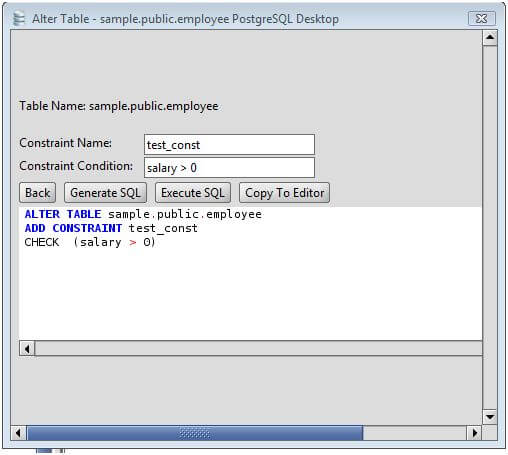

- Alter table postgresql how to#
- Alter table postgresql update#
- Alter table postgresql upgrade#
- Alter table postgresql code#
Instead of relying on Postgres to lock an object when executing a DDL statement, we acquire the lock explicitly ourselves. PostgreSQL offers some additional runtime configuration options that allow us to guarantee query queueing backpressure doesn’t result in downtime. Or maybe you have a few special case queries that you already know will take a long time. Because arbitrarily long queueing of incoming queries is indistinguishable from an outage, we try to avoid any long-running queries in databases supporting our payments processing applications.īut sometimes a query takes longer than you expect. In practice your DDL operations can cause other queries to back up for as long as your longest running query takes to execute. Attempting to acquire this lock causes all subsequent queries on this table to queue until the lock is released. PostgreSQL attempts to acquire an ACCESS EXCLUSIVE lock on the table foos. Note: “Concurrent DDL” for these purposes includes VACUUM and ANALYZE operations.Īll DDL operations generally necessitate acquiring one of these locks on the object being manipulated.
Alter table postgresql update#

Postgres disallows executing CREATE INDEX CONCURRENTLY inside an explicit transaction instead Postgres itself manages the transactions. Note: Concurrent index creation is a special case. PostgreSQL will still execute each separate DDL statement transactionally each statement will be either cleanly applied or fail and the transaction rolled back.

Because locks on multiple tables creates the possibility of deadlock and increases exposure to long waits, we do not combine multiple DDL statements into a single transaction. However, running multiple DDL statements inside a transaction has one serious downside: if you alter multiple objects, you’ll need to acquire exclusive locks on all of those objects in a single transactions. In most cases, you can execute multiple DDL statements inside an explicit database transaction and take an “all or nothing” approach to a set of changes.
Alter table postgresql code#
Alter table postgresql upgrade#
Since that time PostgreSQL has gone through quite a few major upgrade cycles - several of which have added improved support for concurrent DDL.
Alter table postgresql how to#
Several years ago we published a blog post detailing some of the things we had learned about how to safely run DDL ( data definition language) operations without interrupting our production API traffic. To make things even more interesting, we allow zero scheduled functional downtime for our main payments processing services. We rely heavily on the data safety and consistency guarantees a traditional relational database offers us, but these guarantees come with certain operational difficulties. Braintree Payments uses PostgreSQL as its primary datastore.


 0 kommentar(er)
0 kommentar(er)
